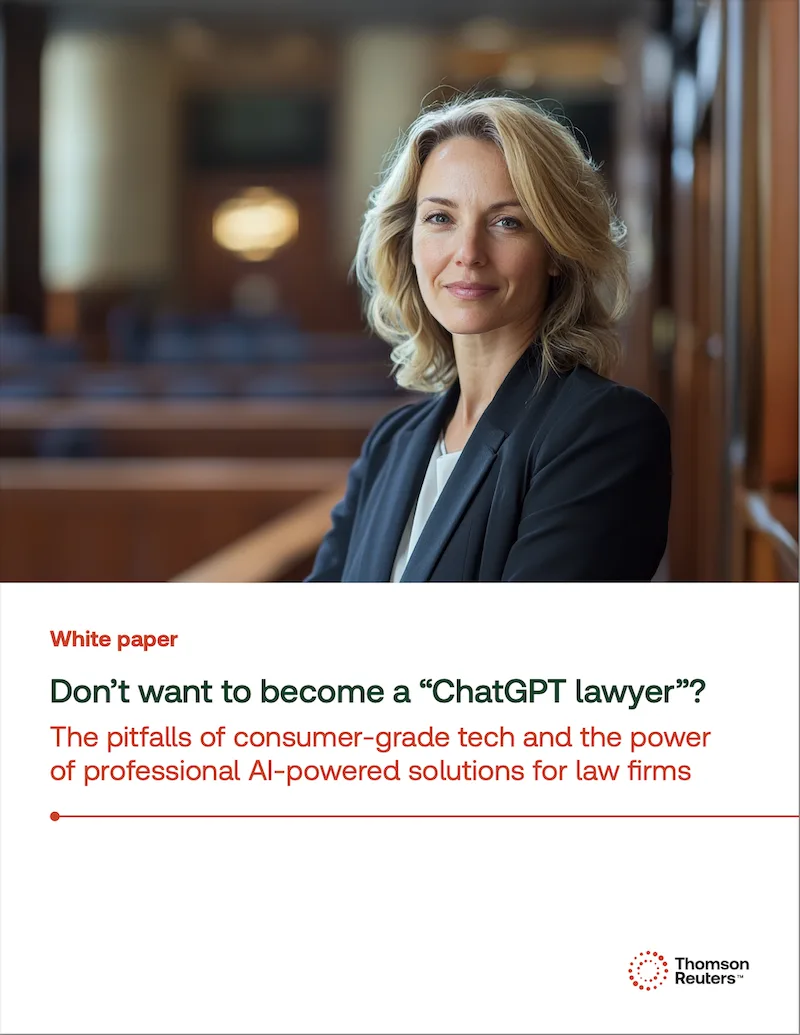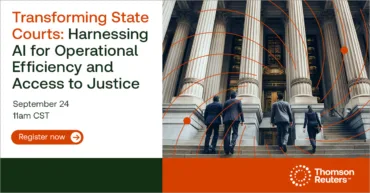Recent court cases reveal why legal AI needs professional-grade content
Highlights
- Recent incidents involving federal judges withdrawing rulings due to errors from public AI tools like ChatGPT highlight the significant risks of AI hallucinations and fabricated citations, which undermine the integrity of the legal system.
- Public AI, trained on unreliable and unvetted internet content, fails to meet professional legal standards, whereas professional-grade AI built on curated databases like Westlaw and Practical Law offers over 95% accuracy and traceability.
- Responsible AI adoption in the legal field requires using tools like CoCounsel Legal that are grounded in authoritative content, provide transparent sourcing for verification, and uphold the rigorous standards of professional accountability.
In a recent Senate inquiry, two federal judges withdrew rulings after AI-generated errors. The use of AI-generated content in court rulings serves as a stark reminder that not all AI is created equal—especially when professional credibility and case outcomes hang in the balance.
Jump to ↓
The high-stakes reality of AI in legal practice
Why public AI tools fail legal professional standards
Professional-grade tools are built on professional-grade content
The verification imperative: Professional responsibility in the AI era
A call for professional standards in legal AI
The path forward: Embracing AI responsibly
The high-stakes reality of AI in legal practice
Senator Chuck Grassley of the Senate Judiciary Committee recently asked two judges whether they used AI in withdrawn court rulings in July. The responses from US District Judges Julien Xavier Neals of New Jersey and Henry Wingate in Mississippi admitted that public AI tools – ChatGPT by Judge Neals’ intern and Perplexity by Judge Wingate’s law clerk – were used in the drafting of those rulings. Both judges corrected the errors swiftly, but these cases highlight that AI hallucinations aren’t just theoretical concerns—they’re real risks that can undermine the integrity of our legal system.
When federal judges rely on AI-generated content that includes fabricated case citations or inaccurate legal precedents, it exposes a fundamental flaw in how many AI tools are built. The problem isn’t AI itself—it’s the content these systems are trained on.
Why public AI tools fail legal professional standards
Most AI tools available today are trained on web-scraped content—essentially, everything available on the internet. For legal professionals, this creates several critical vulnerabilities:
- Unreliable sources: Public AI pulls from blog posts, forums, and random opinions equally with authoritative legal sources.
- Outdated information: No systematic updates when laws change or cases are overturned.
- No editorial oversight: No legal experts validating accuracy before content enters the training data.
- No citation control: The AI has no consistent citator to follow, and so may mischaracterize, wrongly apply, or just invent case names and citations.
The recent judicial incidents underscore what many of us already knew: public AI tools simply aren’t built for the precision and accountability our profession demands.
Professional-grade tools are built on professional-grade content
Here’s the uncomfortable truth: having professional-grade AI tools isn’t enough. The tools themselves must be built on verified, domain-specific content that meets the standards we expect in legal practice.
Consider the difference:
Public AI approach:
- Accuracy rates of 60-70% in legal research
- No guarantee of source reliability
- Limited ability to trace claims back to authoritative precedents
- High risk of hallucinated cases and statutes
Professional-Grade content approach:
- 95%+ accuracy rates when built on curated legal databases
- Every source validated by legal experts
- Direct traceability to authoritative precedents
- Comprehensive coverage with real-time updates
Thomson Reuters exemplifies this professional-grade approach. Our AI solutions are integrated with trusted Westlaw and Practical Law materials—content maintained by 1,200+ attorney editors who ensure every source meets the highest standards of legal research. When CoCounsel Legal provides an answer, it’s drawn from the same trusted content that 99.6% of Fortune 500 companies and 97% of the AmLaw 100 rely on for their most critical legal decisions.
The verification imperative: Professional responsibility in the AI era
Even with the highest-quality AI tools, professional responsibility demands that we verify AI outputs before they leave our desks. The recent judicial incidents remind us that delegation of judgment—whether to a junior associate or an AI system—doesn’t absolve us of responsibility for accuracy.
Best practices for professional-grade AI:
- All answers are integrated with trusted content: Professional-grade systems are built using features including retrieval-augmented generation to ensure that answers are only coming from validated materials.
- Uses a citator you can trust: Professional-grade systems use known and trusted citators. The West Key Number System, for example, has been organizing the law in a way attorneys have trusted and relied on for more than a hundred years.
- Trusted sources: Professional-grade systems only draw from reference resources you trust, such as Practical Law, Westlaw secondary sources, and your firm’s knowledge management system.
- Easily check citations: Professional-grade systems provide users with direct links to citations, so you can quickly verify that cases and statutes are accurate and relevant.
When AI is built on professional-grade content, verifying output is more efficient and reliable. When your AI tool provides direct citations to Westlaw sources, you can quickly validate the accuracy and relevance of every claim.
A call for professional standards in legal AI
The legal profession has always held itself to higher standards than other industries, and for good reason. Our work affects people’s lives, businesses, and fundamental rights. As we integrate AI into our practice, we must demand the same level of rigor from our technology partners that we demand from ourselves.
This means:
- Choosing AI tools built on authoritative legal content, not web-scraped alternatives
- Maintaining verification protocols for all AI-generated work product
- Understanding the source data and limitations of any AI system we use
- Staying informed about AI developments that affect professional responsibility
The path forward: Embracing AI responsibly
The solution isn’t to avoid AI—it’s to use AI responsibly. Legal AI tools such as CoCounsel Legal, grounded in trusted content and providing transparent sourcing, can enhance our ability to serve clients effectively and maintain the professional standards our profession demands.
As the recent federal court incidents demonstrate, the stakes are too high for anything less than the most rigorous approach to legal AI. Our clients deserve research they can trust. Our profession deserves tools that enhance rather than undermine our credibility. And litigants deserve fair, accurate, and correct rulings based on relevant laws and precedent.
The question isn’t whether lawyers will use AI, it’s whether we’ll choose AI tools that meet the professional standards our practice demands.
Ready to experience AI built on trusted legal intelligence? Discover how the professional-grade approach to legal AI in CoCounsel Legal can enhance your practice while maintaining the accuracy and reliability your clients expect.

White paper
The pitfalls of consumer-grade tech and the power of professional AI-powered solutions for law firms
View white paper ↗














